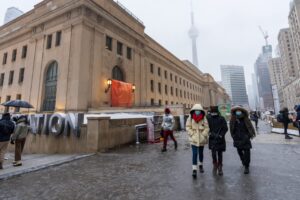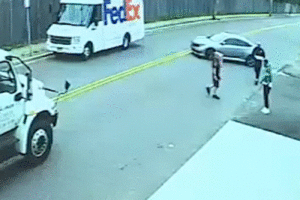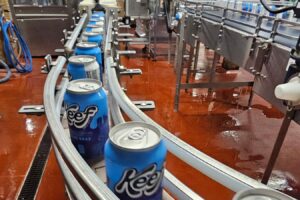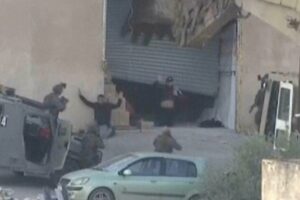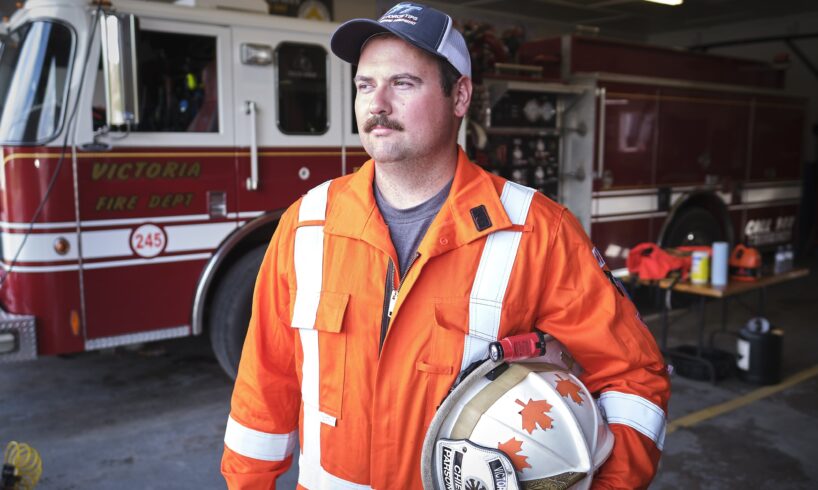
Open this photo in gallery:
Justin Parsons, chief of the volunteer fire department in Victoria, N.L., on Thursday. If the wind changes direction, the Kingston wildfire will move south toward his hometown, which is now on evacuation alert.Greg Locke/The Globe and Mail
Brush crunching under his boots, Justin Parsons studied the plumes of smoke rising high over Heart’s Content Barrens through his binoculars.
“I don’t want to look at this fire any more,” he said, shaking his head.
Perched on a rocky hilltop, Mr. Parsons, chief of the volunteer firefighting unit in the town of Victoria, watches Newfoundland’s largest fire in recent memory engulf the coastline.
Since Aug. 4, the destructive Kingston fire has grown to an estimated 9,838 hectares. If the wind changes direction, the fire will move south toward his hometown, which is now on evacuation alert.
Wildfire smoke is affecting air quality across the country. Here’s what you need to know
Victoria’s volunteer crew of 25 is poised for action, but for the past four days, they have watched from the sidelines. While professional wildfire-fighting crews battle the flames, Mr. Parsons’s team is responding to local emergencies and waiting for updates, relying on public bulletins from the government’s dashboard.
Despite the province calling in the Canadian Armed Forces and RCMP, locals say the island’s values mean they can’t stand idly by. Residents have been taking in neighbours, cooking meals and some have been joining in the firefighting efforts.
Above the ridge, water bombers streak through the sky toward walls of smoke.
White smoke means the fire is feeding on spruce and fir, super-fuel that turns everything into an inferno, explained Mike Parsons, Justin’s father and a volunteer firefighter himself for four decades, gesturing toward the plume.
“When the smoke turns black, you know it’s taking down towns, cars, homes,” he said, eyes not leaving the horizon.
Open this photo in gallery:
Mr. Parsons watches a water bomber over the Kingston wildfire near Victoria.Greg Locke/The Globe and Mail
The Kingston fire continues to spread, having already destroyed around 100 structures including homes and an elementary school. Water bombers and a heavy-capacity helicopter are fighting the blaze’s southern edge, but thick smoke and unpredictable weather grounded aerial support north of the fire.
“This is a new beast for us,” Mike Parsons said, adjusting his green bunker gear. “There’s been nothing like this in 40 years. The fire is in the ground.”
Pre-emptively putting down water lines along roads, Justin’s father is one of many volunteers taking time off work to support their community. The province has promised to compensate volunteer firefighters but hasn’t specified how much or when they’ll be paid.
At a news conference Friday, Newfoundland and Labrador Premier John Hogan said officials requested that the federal government expedite unemployment insurance for islanders unable to work because of the wildfires burning across the province. But volunteer firefighters, who have chosen to temper the flames, aren’t eligible for the benefit.
Since the fires started, there’s been an outpouring of community support.
In Victoria, one woman dropped off new gear, others come by with food and drinks. The crew’s favourite gift is a hot-pink stuffed unicorn, honouring their favourite Chappell Roan track, Pink Pony Club.
The Victoria volunteer firehall is less than four kilometres from the beginning of the evacuation zone in Salmon Cove, where the province co-ordinates its wildfire response in the region from inside an elementary school.
Inside the Salmon Cove command centre, the muffled sound of walkie-talkies echoes through the colourful halls. On Friday, eight water bombers and more than 100 ground personnel were joined by 80 members of the Canadian Armed Forces and three Canadian Coast Guard helicopters to fight fires in Newfoundland.
Open this photo in gallery:
Volunteer firefighters Jack Slade and Anthony Sutton wait for a call at the Victoria Volunteer Fire Department on Thursday.Greg Locke/The Globe and Mail
Afternoons and evenings are peak burn periods, when wildfires are most dangerous and hardest to suppress. This week, the Kingston wildfire conditions were so out of control that aerial and ground teams had to retreat.
“At that point, not only is it unsafe, but the water bombers become ineffective on the front of the fire,” said Craig Coady, director of wildfire management in Newfoundland.
South of the wildfire at the evacuation centre, Maureen Doyle Gillingham anxiously awaits a phone call about what’s happening on the front lines from her husband, Roger, the chief of the North Shore Volunteer Fire Department.
“I haven’t heard anything in three days,” she said on Thursday.
Seated in a collapsible chair, Ms. Gillingham and other wildfire evacuees wonder what’s next. They’ve set up a temporary RV camp in Carbonear where the Canadian Red Cross is registering evacuees.
“We work very closely with the government authorities and the families themselves to try to figure out what their circumstances are,” said Bill Lawlor, the Atlantic region vice-president for the Red Cross. “Not everybody is going to recover at the same rate.”
Of the 4,577 individuals who’ve registered with the Red Cross, 69 are leaning on the organization to provide accommodations as of Aug. 14. Some people who’ve registered don’t need the Red Cross at all because they’ve been taken in by family, friends and other islanders, which isn’t uncommon in Newfoundland where people are very neighbourly, Mr. Lawlor said.
Open this photo in gallery:
A water bomber over the Kingston wildfire. Conditions were so out of control this week that aerial and ground teams had to retreat.Greg Locke/The Globe and Mail
Across the bay, Scott Hillyer and his husband, Cyril Peach, opened their kitchen, cooking dinner for firefighters in Holyrood, who were suppressing the Paddy’s Pond wildfire at the edge of the capital city of St. John’s.
As owners of the local coffee chain Coffee Matters, they and eight employees prepared 300 meals. On Thursday, Holyrood’s crew has turkey with stuffing, gravy, carrots, turnips, green peas for dinner − and fresh-baked cookies for dessert.
“The fire is destroying and there’s really nothing we can do. … These firefighters, as a community, we really owe them a lot, because they’re the ones on the front lines,” Mr. Hillyer said.
Across Canada, provinces are sending air assets, personnel and support to Newfoundland. Officials anticipate another water bomber from Ontario and similar planes from the Northwest Territories.
But locals can differentiate the orange specs in the sky as being water bombers from their own island.
Back outside the firehall, both Parsons and their crew are ready in case the winds change, carrying ash and embers toward Victoria.
The volunteer department said it can’t take credit for the whole community.
“We’re just a splinter in the woodpile,” said Mike Parsons.

